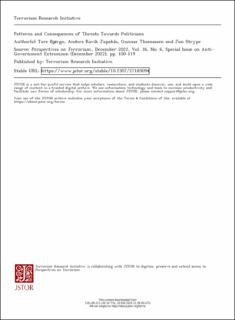Patterns and Consequences of Threats Towards Politicians: Results from Surveys of National and Local Politicians in Norway
| dc.contributor.author | Bjørgo, Tore | |
| dc.contributor.author | Jupskås, Anders Ravik | |
| dc.contributor.author | Thomassen, Gunnar | |
| dc.contributor.author | Strype, Jon | |
| dc.coverage.spatial | Norway | en_US |
| dc.date.accessioned | 2023-03-23T12:41:47Z | |
| dc.date.available | 2023-03-23T12:41:47Z | |
| dc.date.created | 2022-12-20T21:49:36Z | |
| dc.date.issued | 2022 | |
| dc.identifier.citation | Perspectives on Terrorism (PT). 2022, 16 (6), 100-119. | en_US |
| dc.identifier.issn | 2334-3745 | |
| dc.identifier.uri | https://hdl.handle.net/11250/3060129 | |
| dc.description.abstract | Norway has experienced vicious acts of anti-government terrorism in the form of a massive car bomb attack on the government district and a shooting massacre on members of the youth wing of the governing Labour Party in 2011. Still, such acts of violence towards politicians are rare and exceptional. However, violent threats and harassment are common and have a significant negative impact on the private and political lives of elected representatives. In this article, we study the extent to which democracy is being slowly undermined through every day forms of harassment of, and threats against, politicians. The research is based on a unique series of surveys with Norwegian national and local politicians, including the parties’ youth wings, exploring the extent to which they have been exposed to various forms of harassment, threats, and violent attacks, and the consequences. The surveys provide comparable data between different categories of politicians as well as longitudinal data on the experiences of members of parliament and cabinet ministers. The findings show that elected politicians are significantly exposed to hateful harassment, verbal threats, particularly through social media. A few politicians have also experienced actual violent attacks. Such exposure has a major impact on both the private and political lives of the politicians, in particular female politicians. As a result, threats of violence and other forms of hateful harassment towards elected politicians represents a considerable challenge to democratic processes and institutions. Given that Norway is a country characterized by a well-functioning liberal democracy, a low level of political polarization, and a generally high level of trust in authorities among the population, such threat to the democracy system is most likely even more severe in other countries. | en_US |
| dc.language.iso | eng | en_US |
| dc.relation.uri | https://www.universiteitleiden.nl/binaries/content/assets/customsites/perspectives-on-terrorism/2022/issue-6/pot-xvi-6-a8-bjorgo-et-al.pdf | |
| dc.subject | harassment | en_US |
| dc.subject | trakassering | en_US |
| dc.subject | right-wing extremism | en_US |
| dc.subject | høyreekstremisme | en_US |
| dc.subject | social media | en_US |
| dc.subject | sosiale medier | en_US |
| dc.subject | terrorism | en_US |
| dc.subject | terrorisme | en_US |
| dc.subject | threats | en_US |
| dc.subject | trusler | en_US |
| dc.subject | violence | en_US |
| dc.subject | vold | en_US |
| dc.subject | politicians | en_US |
| dc.subject | politikere | en_US |
| dc.title | Patterns and Consequences of Threats Towards Politicians: Results from Surveys of National and Local Politicians in Norway | en_US |
| dc.title.alternative | Patterns and Consequences of Threats Towards Politicians: Results from Surveys of National and Local Politicians in Norway | en_US |
| dc.type | Peer reviewed | en_US |
| dc.type | Journal article | en_US |
| dc.description.version | publishedVersion | en_US |
| dc.source.pagenumber | 100-119 | en_US |
| dc.source.volume | 16 | en_US |
| dc.source.journal | Perspectives on Terrorism (PT) | en_US |
| dc.source.issue | 6 | en_US |
| dc.identifier.cristin | 2096010 | |
| dc.relation.project | Norges forskningsråd: 256205 | en_US |
| cristin.ispublished | true | |
| cristin.fulltext | original | |
| cristin.qualitycode | 1 |
